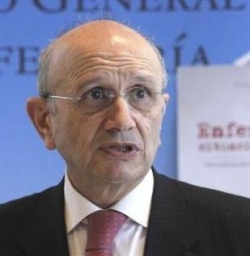Healthcare Mobility
Spanish doctors and nurses emigrate for work
From January 2008 till the end of 2012 around 400,000 Spaniards decided to emigrate to find work, Eduardo de la Sota reports

Since the first signs of what appeared to be an economic meltdown, between early 2008 and July this year, 357,418 Spanish people went abroad to work, according to the Electoral Census of Spanish Nationals Resident Abroad (CERA), which registers those over the age of 18 who wish to exercise their right to vote in Spain whilst in other countries. In 2008, 1.2 million Spaniards were registered with CERA – that figure has now reached 1.56 million.
With the prospect of unemployment, which the Government admits will be over 24 percent in 2013 and 22 percent until at least 2016, this new exodus, which sociologists call ‘selective emigration’, is expected to rise. According to a recent study by researcher Adrían Zamoro ‘Some would like to go to places like New York, Australia and even Africa, but there is much more work available in central Europe. Germany has a high demand for industrial engineers; the Scandinavians for science and research; and in England, Ireland and France they require professionals for their health sectors.’
Spanish doctors emigration
Last year, 2,405 medical doctors applied for certification to work abroad, according to The Medical Spanish Association – a 75% increase compared with 2011. As non-EU states do not require the certificate, the figure relates to EU migration. Médica Colegial, the body that represents Spain’s medical associations, says that, in the first six months of 2013, it issued around 1,350 copies of medical licences required under EU law for doctors and nurses who want to work outside their own country. Last year it issued 2,349 such copies, and 1,835 in the previous year.
The most frequent specialties were anaesthesiology and general practitioners.The most frequent specialties were anaesthesiology and general practitioners. In 2012, for example, 295 doctors from Valencia (a high unemployment region) applied for the certificate. Interestingly, powerful Catalonia sent 440 doctors abroad. Only in the Basque country (with the highest per capita income and lowest unemployment rates) did doctors’ emigration decrease.
83% of doctors seek jobs in Europe (mainly the UK and France) and 7% America. Two in three doctors apply for public hospitals.
Nurses are also leaving
Máximo González Jurado, president of the General Council of Nursing Colleges, is worried about the longterm implications of the medical brain drain: ‘Spain continues to train magnificent professionals. It’s a tragedy that they are being snapped up by other countries when there is a shortage of nurses, and many hospitals are having to cope with minimum staffing levels.’ Spain has about 541 nurses for every 100,000 inhabitants, compared to 797 in the rest of the EU. ‘The cuts mean that contracts are not being renewed and people leaving are not being replaced, among other measures – and this means things will get a lot worse.’
Pablo Rubio used HCL’s services – one of the UK’s leading nursing and healthcare recruitment agencies – once. The 24-year-old nurse was already in London. He has been there for nine months and is happy with his new life. He explains that the only members of the team who graduated from his university in Castellón last year went abroad to find work. All those who stayed in Spain are jobless, ‘Only those of us who went abroad are now working.’
The nurse works in several east London hospitals and does home visits in the west of the city. He works a 12-hour shift three days a week and has the rest of the time to himself. ‘Working arrangements are much more flexible in Britain than in Spain. Employees are looked after, and with what I’m paid I’m able to live well, pay my rent, food, transport and still have something left to save. I don’t know when I’ll be going back to Spain. I’ll stay here for at least a couple of years more and hope that things sort themselves out in Spain. I’ve made friends here; it’s like having a small family.’
Reasons & consequences
It isn’t that there are too many medics in Spain. In 2009, the Health Ministry warned that there was a shortage and that the country needed around 3,200 more doctors. By 2025, at the present rate the shortfall will be around 25,000. The government has talked of increasing the number of university and medical school places, as well as making it easier for overseas personnel to work here. The country’s medical associations disagree, saying that the problem is not so much a lack of trained medics, but rather the poor distribution of specialists.
Either way, the current crisis has hit the sector hard and experts say the brain drain has only just begun. Juan José Rodríguez Sendín, president of Médica Colegial, predicts there will be more than 10,000 unemployed medics within two years. ‘There’s been no reduction in the number of places to study medicine; around 7,000 doctors qualify each year, and more and more of them will join the unemployed. Their only hope of finding work is to go abroad. Some are happy to seek a new life and career opportunities abroad, but the majority feel that they have no choice,’ he believes.
Obviously, the principal reason to emigrate is human resources cuts in the Spanish Healthcare sector, caused by the crisis. The few next years’ forecasts are not at all optimistic. Spain’s worsening economic crisis -- coupled with deep spending cuts in health that mean working under temporary contracts with little hope of a permanent position in a hospital -- is prompting growing numbers of young medics, whose training has cost the country millions of euros, to leave to work abroad. Thus, Spain faces a scientific as well as economic loss. The country is failing to capitalise on highly qualified professionals (the cost of training a doctor is around €200,000 euros). Full recovery from this situation will need, at least, a decade.
Spanish doctors in Sweden
Eskilstuna is an attractive town around 120 kilometres west of the Swedish capital of Stockholm, the HQ of carmaker Volvo, and the home of Abba singer Frida Lyngstad. This is the home to paediatrician Jorge Sotoca and ophthalmologist Mercedes López, a Spanish couple both aged 33. Last February they started work at Eskilstuna’s hospital, which has a catchment area of 400,000 people.
Their reasons for leaving Spain are simple: ‘Job insecurity, uncertainty and fear about where Spain is heading, few opportunities for career growth, and the chance to give our daughter a good start in life,’ Jorge Sotoca explains.
Job opportunities
• According to the BBC News Website (2013), at least 18 countries in the world are interested in recruiting GPs and specialist doctors, most relevantly:
• Australia - Anaesthetists, gastroenterologists and neurosurgeons are among the 30 specialists Australia needs. National average salary: US$44,983 Rodríguez Sendín, president of Médica Colegial
• Germany - About 5,000 doctors are needed. This is the country’s best-paid profession: average salary €49,000 (US$63,741) .per annum.
• United Kingdom - This country needs seven types of specialist practitioners, including paediatricians and gynaecologists, and consultants in haematology and forensic psychiatry. Here the national average salary is US$44,743
*Report based on an August 2012 El Pais article
05.09.2013






